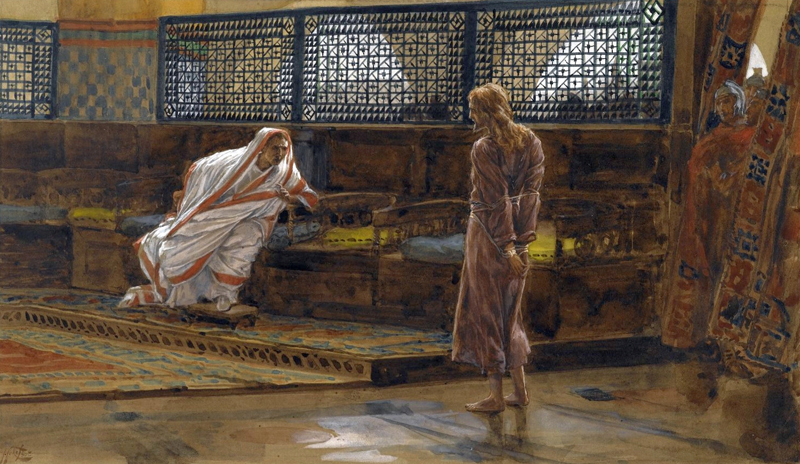
Jesus Before Pilate, First Interview
James Tissot, 1890
My dear friends,
As today's Gospel reading opens, Jesus is brought into Pilate’s headquarters as a political prisoner, having been arrested and accused by his own people of claiming a kingship that threatens the power structures of the time. Though Jesus is widely known as a teacher and healer, his message of compassion, forgiveness, and a higher allegiance to God’s kingdom has unsettled the religious and political leaders. Now, he stands before Pilate, the Roman governor, whose authority symbolizes the immense political force of the empire. In this charged atmosphere, Jesus is not the type of king Pilate expects; his lack of resistance, his calm demeanor, and his purpose defy the usual displays of power, setting the stage for a life-and-death dialog about the nature of truth, authority, and the true kingdom of God.
"Are you the King of the Jews?"
- John 18:33
Pilate's question about kingship reveals his fixation on power, yet Jesus invites him to see beyond the literal. On the Bodhisattva path, we learn that ultimate truth transcends worldly roles and titles. A bodhisattva's “kingship” lies in mastery over one’s mind and in serving others without attachment. Jesus, here, demonstrates such spiritual sovereignty—a sovereign who lives for truth and love, beyond worldly status or political might.
- John 18:34
Jesus' response encourages Pilate to examine his own understanding and motives. In the Bodhisattva’s journey, one learns that seeking truth requires inner clarity and sincere introspection. Jesus invites Pilate—and us—to look deeply and see whether our views arise from genuine understanding or from conditioned beliefs handed down by others. This is an invitation to the truth that liberates.
Your own nation and the chief priests have handed you over to me. What have you done?"
- John 18:35
Here Pilate's words reveal a separation he feels between himself and those he governs, as well as his distance from Jesus’ message. This division echoes the obstacles to spiritual growth when we perceive others as fundamentally separate from ourselves. On the Bodhisattva path, we cultivate a mind that embraces all beings. By reducing this mental separation, we come closer to understanding Jesus' message of unity in truth and compassion.
If my kingdom belonged to this world,
my followers would be fighting to keep me from being handed over to the Jews.
But as it is, my kingdom is not from here."
- John 18:36
Jesus reveals the nature of his kingdom, rooted in peace and truth rather than in worldly conflict. In Buddhism, this aligns with the Bodhisattva’s understanding of ultimate truth: it does not engage in the divisive struggles of samsara. Jesus speaks of a kingdom where love and wisdom are the guiding forces, a realm accessible to all who seek with a pure heart and mind. In this, he exemplifies the bodhisattva vow to renounce worldly gain in favor of boundless compassion.
Jesus answered, "You say that I am a king.
For this I was born, and for this I came into the world, to testify to the truth.
Everyone who belongs to the truth listens to my voice."
- John 18:37
In this moment, Jesus affirms his purpose: to bring truth to light. The Bodhisattva, too, is born into the world to serve truth by alleviating suffering and guiding beings toward enlightenment. Jesus teaches that truth is recognized not by worldly allegiance but by an awakened heart illumined by divine wisdom. Like a Bodhisattva, Jesus invites us to follow not with blind allegiance but through understanding and love for all.
After he had said this, he went out to the Jews again and told them,
"I find no case against him."" - John 18:38
Pilate's question lingers, leaving us to contemplate the nature of truth. For the Bodhisattva, truth is not static but is realized through direct insight into the nature of reality. Jesus presents truth as a voice, a calling, rather than a mere concept. In this, truth is a lived experience, discovered in the compassionate acts and wisdom of those who walk in love. Pilate’s question, though unanswered by Jesus, opens the door for us to listen and discover this truth within ourselves.
As we celebrate Reign of Christ Sunday, let us remember that the kingdom Jesus speaks of is alive within each heart willing to walk the path of love and wisdom. This is the essence of the Bodhisattva way, to recognize our own calling to embody compassion and truth. In doing so, we participate in a kingdom “not of this world”—a kingdom that lives wherever love and understanding prevail.